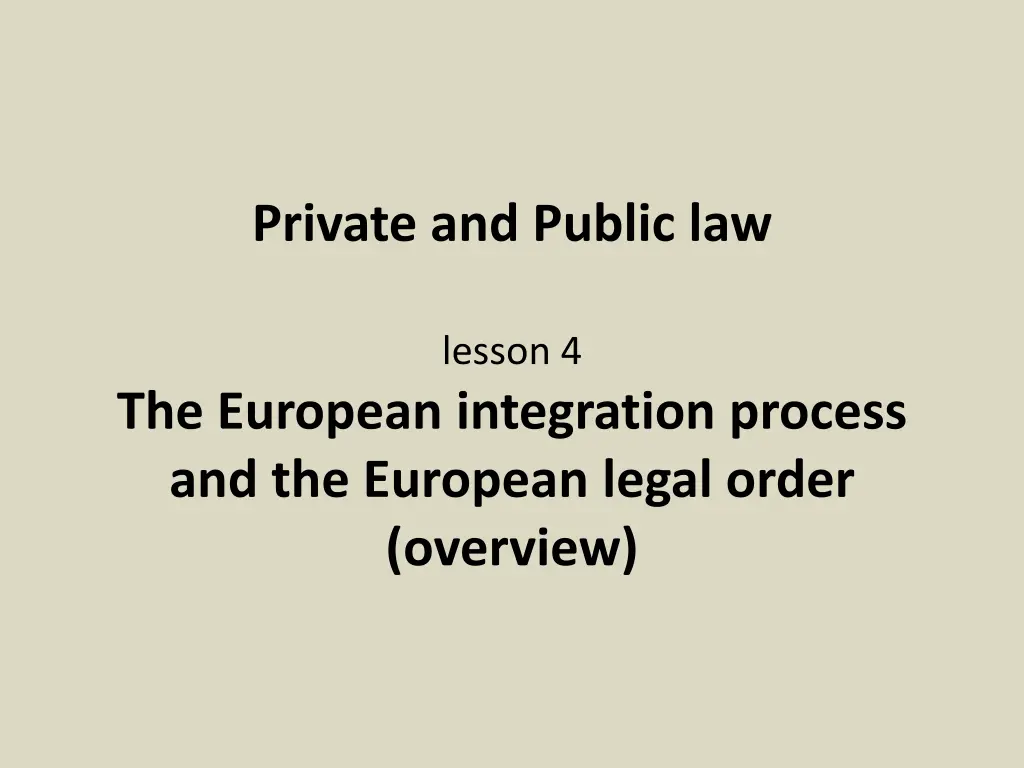
European Integration Process & Legal Order Overview
Understanding the European Integration Process and Legal Order involves concepts such as the principles of conferral, subsidiarity, and proportionality. The European Union acts based on conferred competences, intervening only when necessary and effective. National parliaments play a role in supervising EU actions, ensuring alignment with subsidiarity principles.
Download Presentation

Please find below an Image/Link to download the presentation.
The content on the website is provided AS IS for your information and personal use only. It may not be sold, licensed, or shared on other websites without obtaining consent from the author. If you encounter any issues during the download, it is possible that the publisher has removed the file from their server.
You are allowed to download the files provided on this website for personal or commercial use, subject to the condition that they are used lawfully. All files are the property of their respective owners.
The content on the website is provided AS IS for your information and personal use only. It may not be sold, licensed, or shared on other websites without obtaining consent from the author.
E N D
Presentation Transcript
Private and Public law lesson 4 The European integration process and the European legal order (overview)
INDEX 1. on which conditions is the EU entitled to act? 2. what are the main types of EU legislation?
1. on which conditions is the EU entitled to act?
When is the Union entitled to act in a policy area? _______________________________________ The principle of conferral The principle of subsidiarity The principle of proportionality
1. the principle of conferral _________________________________ According to the principle of conferral, the Union has only those competences that are conferred upon it by the Treaties - exclusive competences - competences shared with member States
2. the principle of subsidiarity _________________________________ The principle of subsidiarity aims at determining the level of intervention in the areas of competences shared between the EU and the Member States. According to the principle of subsidiarity, the EU may only intervene if it is able to act more effectively than Member States.
(follows) the principle of subsidiarity _________________________________ - be dealt with by Member States? Does the action have transnational aspects that cannot - contrary to the aims/requirements of the EU Treaty? Would national action or the absence of action be - Added value of the European action, taking into consideration the size and effects of the action at stake Does action at European level have clear advantages?
(follows) the principle of subsidiarity _________________________________ - Treaty, the national Parliaments are entitled to supervise the EU actions in the light of the principle of subsidiarity; obligation of the European bodies to keep national Parliaments informed and updated According to the Protocol No. 2 attached to the Lisbon - All acts issued at the European level must be justified in the light of the principle of subsidiarity / proportionality (however, in the decision Germany v. Council, the European Court of Justice held that an act may be implicitly justified => recitals) - each Member State / its Parliament may challenge a European Act adopted in conflict with the principle of subsidiarity (before the European Court of Justice)
(follows) the principle of subsidiarity _________________________________ - European act adopted in contrast with the principle of subsidiarity The Court of Justice is entitled to declare invalidity of a Does this entail a discretionary evaluation? Is the Court entitled to evaluate the merits of the EU decision? ( added value brought by the European act)
(follows) the principle of subsidiarity _________________________________ National Parliaments 1/3 of all votes granted to Parliaments Simple majority of votes granted to Parliaments veto Opinion against approval of an European act
3. the principle of proportionality ___________________________________ According to the principle of proportionality, the means used by the EU cannot go beyond what is necessary to meet the objectives set by the Treaties
3. the principle of proportionality (follows) ___________________________________ - Proportionality affects both the form (i.e., type of legislation: directives, regulations, etc.) and the content of EU acts (e.g., sanctions must be proportionate/adequate to the punished behavior) - a claim may be brought before the Court of Justice - the principle of proportionality applies to all competences of the EU (not only shared competences)
Summing-up conclusions ___________________________________ The Union can only act in a policy area if: 1. the action falls within the competences conferred upon the EU by the Treaties (principle of conferral); 2. in the context of competences shared with Member States, an intervention by the Union is legitimate if the goal could be not achieved (or would be inefficiently achieved) at a national level (principle of subsidiarity); 3. the content and form of the action do not exceed what is necessary to achieve the objectives set by the Treaties (principle of proportionality).
2. what are the main types of EU legislation?
Sources of EU law ______________________________ - regulations - directives - decisions - recommendations - opinions - atypical deeds
The importance of identifying the category of act _________________________________ - The act may directly applicable in domestic law - Procedure to be followed to challenge each act
The importance of identifying the category of act _________________________________ In order to identify the applicable category, we should make reference to: - its title (if the act makes reference to a particular form or procedure) - its actual contents and subject matter
Creation of a EU act _________________________________ The legislator s duty to provide a rationale : factual and legal basis of the act ( whereas ) in absence of a justification, an act may be held as invalid, since, in case of dispute, the Court is not in a position to consider and analyze its rationale
Creation of a EU act _________________________________ The legislator s duty to provide a rationale : factual and legal basis of the act ( whereas ) the legislator does not necessarily need to include a full description of the factual background (the context in which the act is born may be held as implicit)
REGULATIONS _________________________________ Regulations: 1- have general application 2- are binding in their entirety 3- are directly applicable in all Member States
REGULATIONS _________________________________ - Regulations have general application. But what if a Regulation envisages specific persons? The case of regulations against terrorism - Regulations do not need any implementation measure. But what if a regulation needs some enactment decision (specifying practical aspects), to be approved by Member States? May/should Member States provide for sanctions to be applied in case that citizens act in breach of an EU Regulation? - Regulations directly apply in all Member States. But what if a Regulation applies to some of them only?
REGULATIONS _________________________________ Regulations create rights which are directly enforceable by each individual before domestic Courts, both against other individuals ( horizontal relationships), and against the State / public bodies ( vertical relationships).
DIRECTIVES _________________________________ Directives: 1- do not necessarily have general application 2- are addressed to Member States only 3- require implementation measures to be adopted by Member States 4- are binding as to the result to be achieved; Member States remain free to choose the forms and methods to implement directives into domestic law. Directives are generally more in line with the principles of subsidiarity and proportionality
DIRECTIVES _________________________________ - Directives need to be implemented into national laws. What if a directive already contains a detailed and complete regulation of the relevant policy area? Are detailed directives illegitimate? - Member States must implement directives by a given deadline. Is there any obligation before the elapse of the deadline? What if a directive is not implemented (or it is inadequately implemented) by the deadline? Infringement proceeding + possible restoration of damages in favor of individuals - Member States are free to choose the most appropriate methods to implement directive. Is this freedom absolute?
DIRECTIVES _________________________________ - A directive may have direct effect in Italy and, thus, create rights directly enforceable by individuals against the State before local Courts. This subject to: (A) the directive being sufficiently clear and precise ; (B) the directive imposing an unconditional obligation on the Member States; (C) the directive being aimed at creating rights in favor of individuals; (D) the deadline for implementation being expired and the Directive being not implemented in the Member State
DIRECTIVES _________________________________ Directive, however, may direct effect with respect to vertical relationships only
DECISIONS _________________________________ Decisions: 1- are binding in their entirety 2- may either specify their addressees or not (after the Treaty of Lisbon) 3- may be addressed to either Member States (e.g., decisions regarding State aids) or to individuals (e.g., decisions regarding competition among undertakings) 4- depending on each specific case, may have direct effect in Italy






















